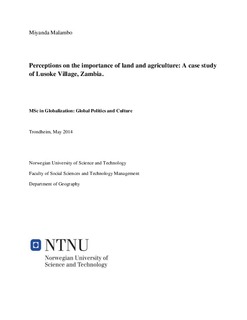Perceptions on the importance of land and agriculture : a case study of Lusoke Village, Zambia
Master thesis

View/
Date
2014Metadata
Show full item recordCollections
- Institutt for geografi [1119]
Abstract
Globalization brings many changes which are not limited to urban areas. The rural in the global south has also been touched by global processes such as modernization and urbanization. As a result, the livelihood strategy of agriculture dominant in rural areas and used as the main source of livelihood outcomes by women is affected. This study, using the assemblage theory as the guiding analytical tool, looked at how women’s perspectives in Lusoke village of Chongwe, Zambia, are affected by the changing environment and how this ultimately affects their livelihood strategies. With a sample size of 30 respondents, semi-structured interviews were used to ask and answer the following questions;
1. What are women’s perceptions of land accessibility in Lusoke village? 1b. Are women’s perceptions different from those of men?
2. What are the perceived benefits of women owning land for both agricultural and non-agricultural purposes?
3. Are women in Lusoke village changing livelihood strategies from predominantly agricultural to non-agricultural ones? 3b. If women are changing livelihood strategies, what may be future implications for agriculture in Lusoke village?
The general findings in the study were that land still remains an important part of women’s liveliood in Lusoke village. However, agriculture remains important only to the older generations while young generations opt to diversify livelihood strategies away from agriculture. The perceptions on land access and availabiliy, as well as interaction with other people have an influence in the way the women choose to seek livelihood outcomes.